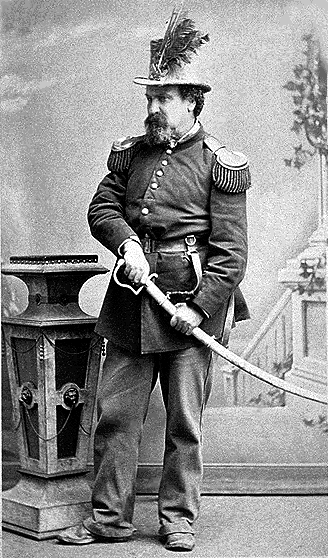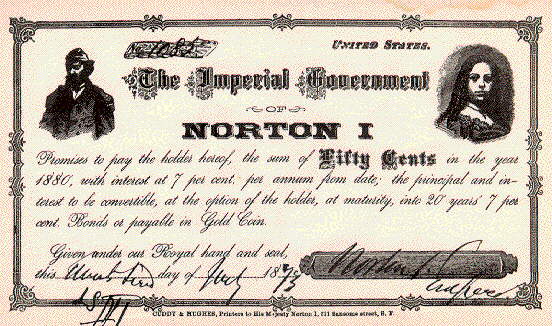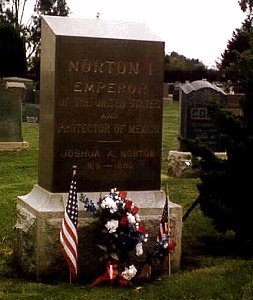Emperor Norton
 Joshua Abraham Norton (February 14, 1819 - January 8, 1880) quietly ditched England as a young man, traveled through the Cape of Good Hope, and settled in America with forty thousand dollars. He opened a successful business selling mining supplies to gold prospectors, and the land he purchased would later become San Francisco's Cow Hollow district.
Joshua Abraham Norton (February 14, 1819 - January 8, 1880) quietly ditched England as a young man, traveled through the Cape of Good Hope, and settled in America with forty thousand dollars. He opened a successful business selling mining supplies to gold prospectors, and the land he purchased would later become San Francisco's Cow Hollow district.
Click here to watch the video version of this article!
He hit upon a bold scheme after studying San Francisco's large immigrant and Chinese population: he'd order massive shipments of chopsticks and rice, virtually cornering an emerging market. Unfortunately, when the shipment arrived from Europe, there existed twice as much rice as Norton could actually pay for. He went bankrupt on the spot, and spent the next three years in court.
Then he vanished.
Nine months later, he emerged a complete madman on the streets of San Francisco. Adorned with a beaver hat and full-on naval regalia, Norton marched into the press offices of The Bulletin and submitted the following for immediate publication:
At the preemptory request of a large majority of the citizens of these United States, I, Joshua Norton, formerly of Algoa Bay, Cape of Good Hope, and now for the past nine years and ten months of San Francisco, California, declare and proclaim myself Emperor of these United States, and in virtue of the athority thereby in me vested do hereby order and direct the representatives of the different States of the Union to assemble in Musical Hall of this city, on the 1st day of February next, then and there to make such alterations in the existing laws of the Union as may ameliorate the evils under which the country is laboring, and thereby cause confidence to exist, both at home and abroad, in our stability and integrity.
Norton I
Emperor of the United States
September 17th, 1859
That's right. He proclaimed himself "Emperor of the United States," Protector of Mexico, and prospective consort to the Queen of Great Britain. He fully discharged politicians from their duties, proposed the dismantling and abolishment of Congress, and demanded military backing so lingering lawmakers might be forcibly removed from their posts. Nobody showed up for these meetings of course, because nobody was paying any attention. Emperor Norton's singular goal was to secure control of the States by gradually dissolving the existing Republic of America. His decrees were written in exactly the manner of high English one might expect, sprinkled with hereby's, hitherto's and forthwith's-- and each constituted a larger part of Norton's campaign to enhance community spirit with over-the-top fanfare and not-so-subtle nonsense.
These ludicrous declarations might have gone unnoticed, but Norton quickly developed a cult following. People on the streets would bow and curtsey when'er he passed, and San Francisco was all too willing to accept him as their wise, caring monarch. "Emperor" Norton was equal parts Andy Kaufman and Mark Twain, a shambling clown of a public figure who fed tabloid writers daily material in their columns devoted to "weird news" and eccentric personalities about town.
In no time at all, Bay Area newspapers were competing for the honor of posting his proclamations, and more than once they published fakes to generate sales - a practice the Emperor condemed. Norton's self styled "Imperial Government" even went so far as to manufacture its own currency in fifty-cent, five and ten dollar denominations. His money was accepted without question, at a time when U.S. paper currency was still considered unreliable.
 One day he tried to cash $100 worth of his own notes at the First National Bank. When they refused, he "foreclosed" upon them in yet another proclamation.
One day he tried to cash $100 worth of his own notes at the First National Bank. When they refused, he "foreclosed" upon them in yet another proclamation.
Norton tried to have Andrew Jackson arrested and sentenced to blacken his boots. In another decree, he patly fired President Abraham Lincoln.
In still another, Norton bans use of the word "Frisco":
Whoever after due and proper warning shall be heard to utter the abominable word "Frisco," which has no linguistic or other warrant, shall be deemed guilty of a High Misdemeanor, and shall pay into the Imperial Treasury as penalty the sum of twenty-five dollars.
His royal decrees were enthusiastically received by citizens living in the Bay Area. He proposed city engineers tear down Mount Diablo one shovelful at a time in order to construct a tunnel and suspension bridge connecting Goat Island with Oakland Point, thereby "giving back" Goat Island to the Oakland community. If taxes were too high, he'd lower them. If there were inadequate public facilities, he'd order them fixed. He made the rounds, ensuring police were on their beats and city harmony prevailed. If Emperor Norton observed someone performing a kind act, he'd declare him or her king or queen for a day. Thes titles were especially popular with children, who would follow him in groups picking up litter.
 He ate free of charge in restaurants. He had three seats reserved at every theatrical performance: one for himself and two for his dogs, Bummer and Lazarus. San Francisco actually paid for his uniforms and the local Masonic Lodge took care of his rent.
He ate free of charge in restaurants. He had three seats reserved at every theatrical performance: one for himself and two for his dogs, Bummer and Lazarus. San Francisco actually paid for his uniforms and the local Masonic Lodge took care of his rent.
In January of 1867, Norton was accidentally arrested by a rookie policeman who believed he required confinement and treatment for his mental disorder. Public outrage was immediate: editorials in every newspaper denounced the action, and there existed the possibility of a genuine riot.
Chief of Police Patrick Crowley opened the cell doors and issued a lengthy public apology to the Emperor. From then on, police officers would salute His Majesty whenever he passed them on the street.
At age 65, Norton collapsed of apoplexy at the corner of California and Grant, dropping his trademarked bamboo umbrella into the gutter. Coroners found in the pockets of his wrinkled uniform astounding telegrams: one from Czar Alexander II congratulating him on his forthcoming marriage to Queen Victoria, and one from the President of France, who warned Norton that such a marriage could be disastrous to world peace.
 Also found was a coin purse, three dollars in silver, an 1828 French Franc, and several of his fictitious "Imperial" bonds which Norton liked selling to tourists at 7% interest.
Also found was a coin purse, three dollars in silver, an 1828 French Franc, and several of his fictitious "Imperial" bonds which Norton liked selling to tourists at 7% interest.
Reporters who'd covered the life and times of Emperor Norton for years broke into his room and ransacked the place. They found frayed uniforms hanging from nails, lithographs and portraits of royalty, and obscurely carved walking sticks. On the walls were yellowed newspaper clippings written by those now standing in his otherwise empty room.
The squalor of the Emperor's personal life was fully exposed, but he was so beloved that ten thousand people showed up for his funeral, which was complimented by full military honors. Mark Twain wrote an touching epitaph for his dogs.
timeline
| 17 Sep 1859 | San Francisco resident Joshua A. Norton proclaims himself Emperor of these United States, a title he retains until his death in 1880. The successor to Emperor Norton I has yet to be anointed. |
| 16 Jul 1860 | A decree from Emperor Norton I of San Francisco, Emperor of the United States and Protector of Mexico, dissolves the United States of America. |
| 12 Aug 1869 | In San Francisco, Emperor Norton I issues a stern edict outlawing both the Republican and Democratic political parties. Violators face a prison term of five-to-ten years. |
| 8 Jan 1880 | Norton I, Emperor of the United States and Protector of Mexico, dead in San Francisco. Born Joshua A. Norton, he was adopted by the citizens of the city and issued frequent imperial proclamations. |